Understanding Your Audience with Keyword Research

Understanding your audience with the help of keyword research can elevate your SEO strategy. This article explains what keyword research is, why it’s so important and how you can do it.
Keyword research has been a mainstay of SEO strategies since the dawn of time...or at least that’s what it can feel like. Keywords are the foundations of SEO. If nobody is searching for your target keywords then you can rank in the top spot all you like, you won’t get any traffic from it.
Keyword research ensures you’re targeting the right keywords for your business, helping you to keep your ear to the ground in order to fully understand what your audience are searching for and how they’re doing it.
Table of Contents
What is Keyword Research?
Keywords are the bridge between the initial search query and the content on your website. Put simply, they’re the actual words that a user inputs into a search engine when making a query.
When crawling and indexing your website, Google will read your content for keywords that match the terms used in a search query. If your website is optimised well for these keywords Google will determine it to be relevant to the search query and rank it accordingly in the results it presents to the user.
Keyword research is the process of understanding and analysing the language that people use when making a search query in order for you to establish which keywords will be the most beneficial for you to target and optimise your website for.
Why is Keyword Research so Important?
Audience research is essential to all areas of business and your SEO strategy is no different. Keyword research is a great way to help you understand your audience and their searching behaviour - also known as search intent
Keyword research allows you to ensure the content you’re creating is relevant to the search queries people are making and is the content that your audience are looking for. Keyword research is the only way for you to get an idea about what people are searching for so that you can make sure your website provides them with the right answers.
Google even gives you this data when you search for certain topics, let's take the term 'washing machines' for example:
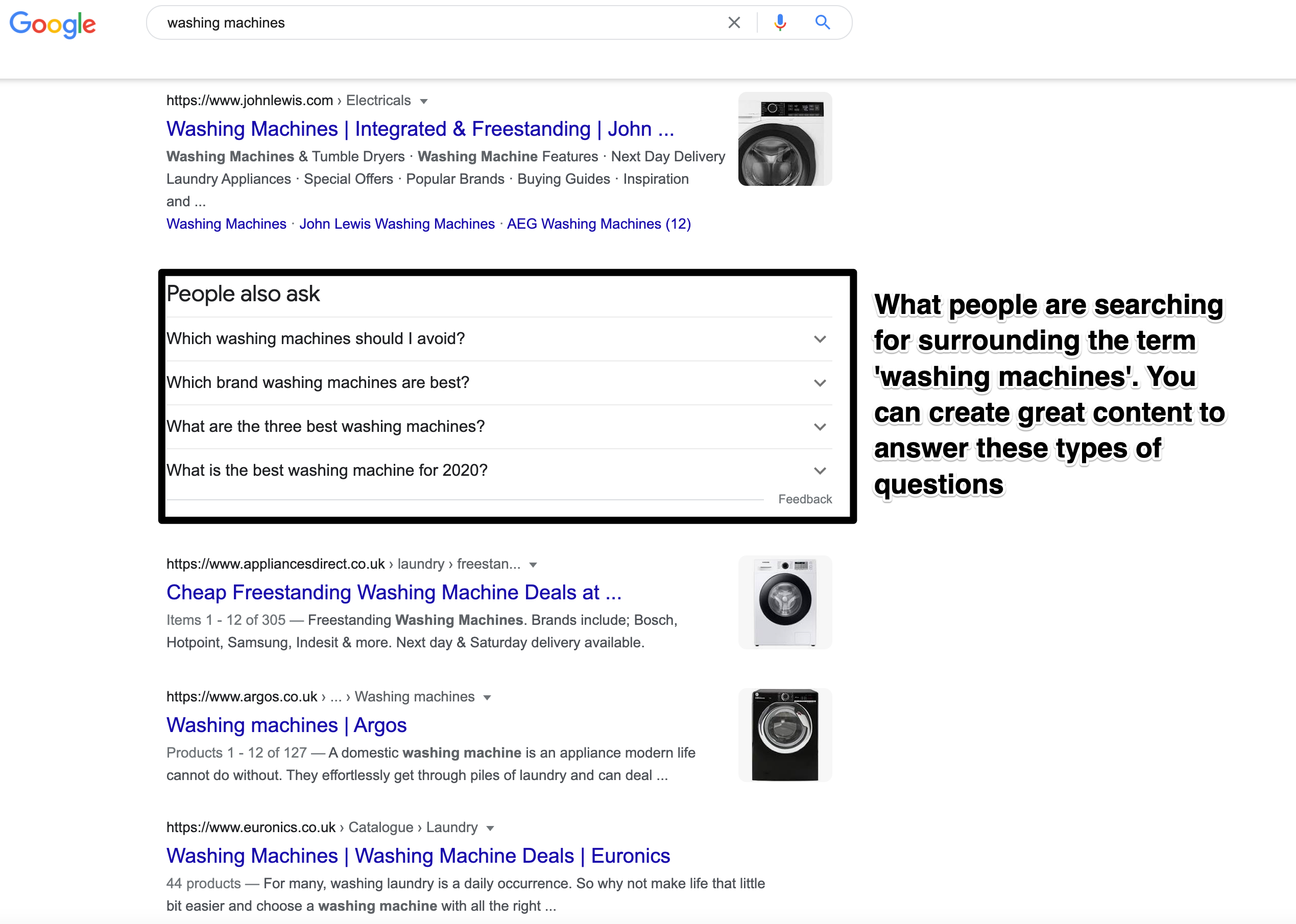
Google still places a lot of importance on keywords. When its bots crawl your website they’re looking for keywords that match the original search query so you can see how undertaking keyword research to make sure your optimising for the right terms can have a major impact on your rankings.
Once you’ve undertaken your keyword research and are ready to implement them on your website remember to avoid keyword stuffing. This is the process of literally stuffing your web pages full of your keywords, using them over and over again everywhere from the headings to anchor text to image captions. Google has a dim view of keyword stuffing, in fact it’s one of the search engines “black hat” SEO tactics which means it goes against their guidelines.
If Google thinks you’re keyword stuffing it will penalise you in the rankings. Users will also be able to tell that your content feels spammy and will be more likely to leave your website without converting.
How to Undertake Keyword Research
There are various steps that you can take when completing your keyword research to help you find the keywords to target which will set you on the path to SEO success.
Determine relevant topics - Firstly you need to think about the topics that your website actually features. Start by making a list of key areas and topics that your website content is centred around. For instance if you sell coffee machines this might include things such as “coffee”, “espresso” and “coffee machine”.
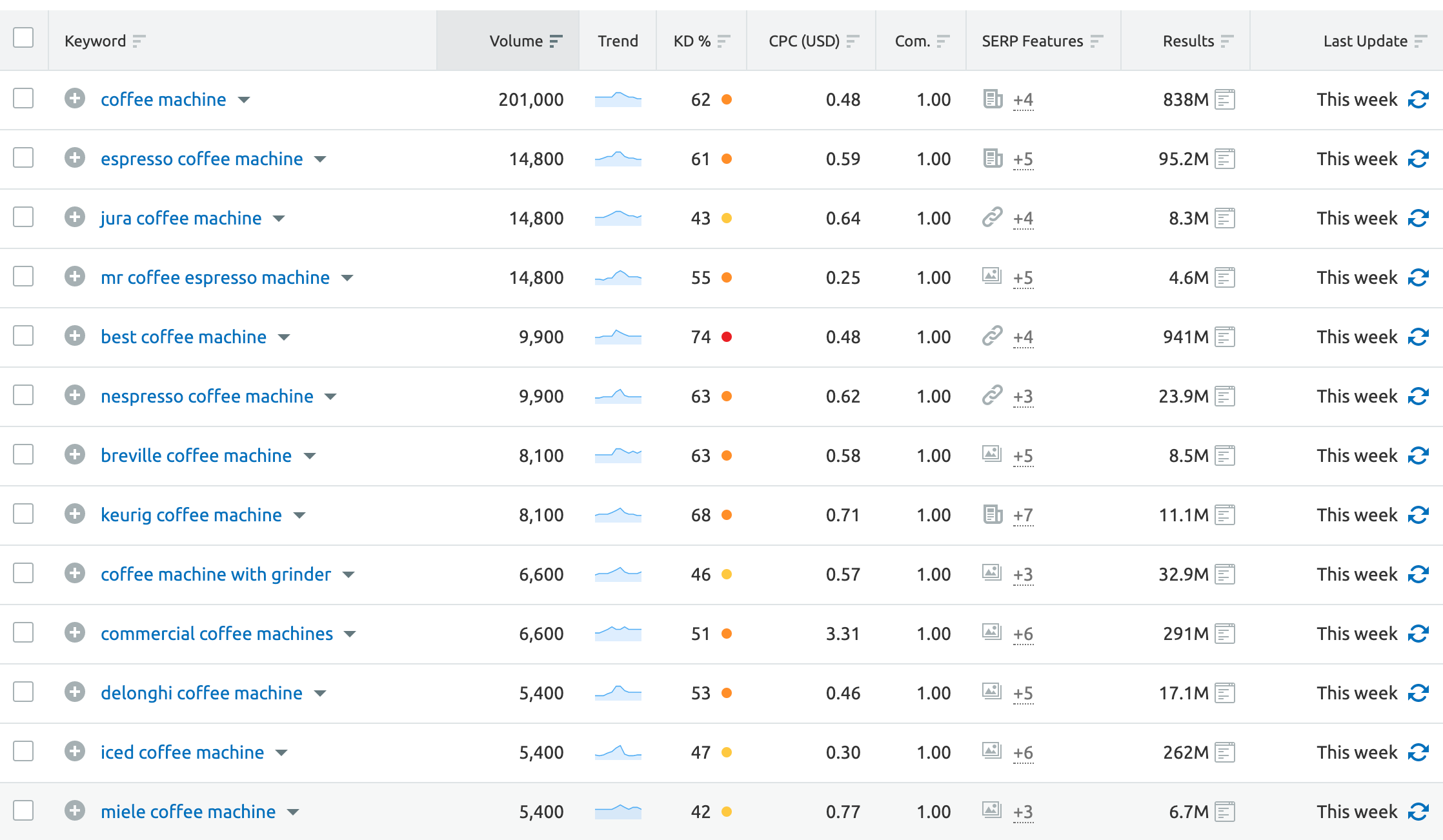
You need to firstly ensure that your list of topics are relevant to your website. For example if you don’t even sell something or provide content around that topic, don’t target it as a keyword. Google is always looking for the most relevant websites and content to rank.
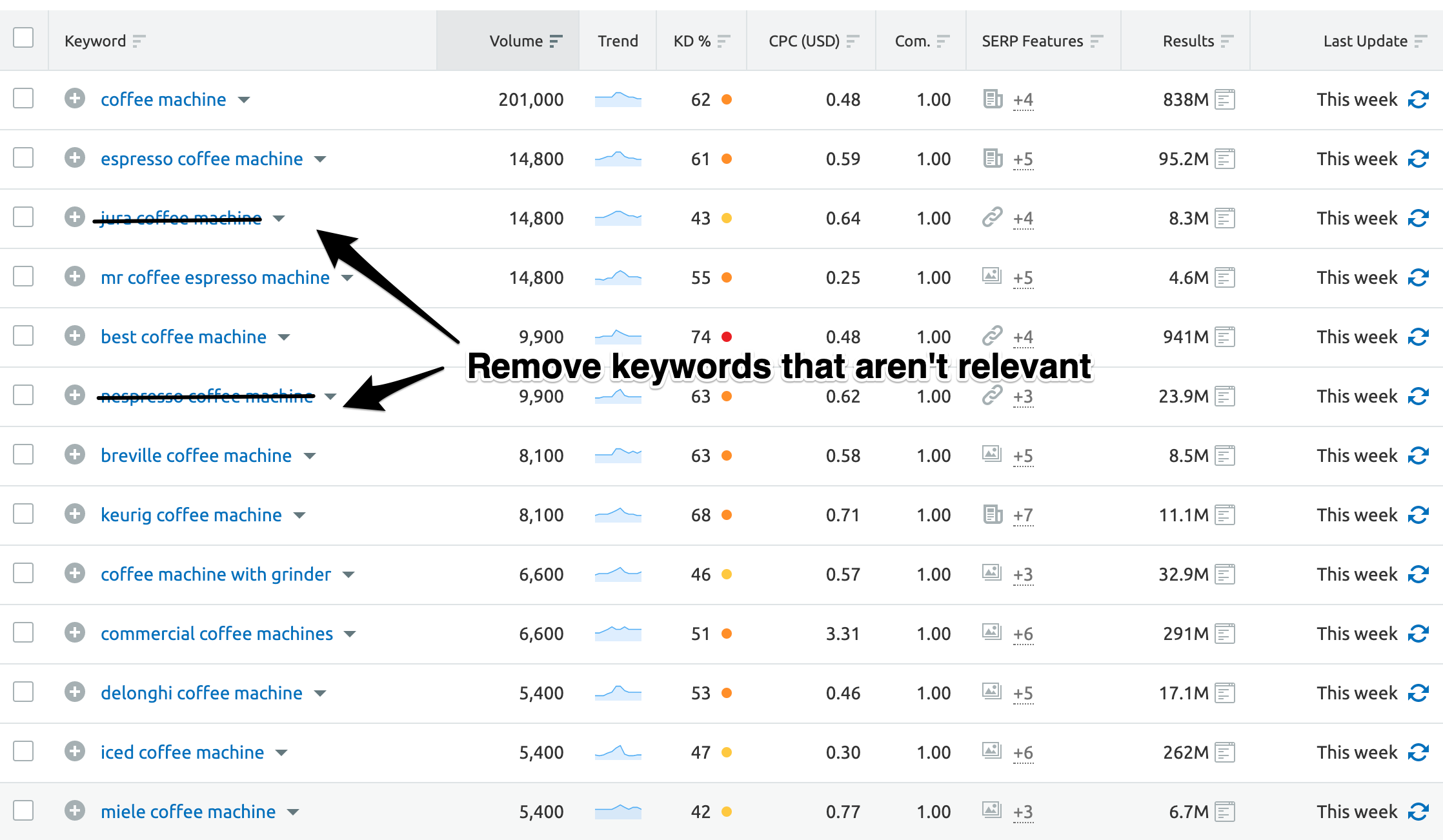
Once you’ve made your primary list of topics you can begin expanding them into a list of keywords and search terms to target. After all, it’s unlikely that you would be able to rank for “coffee” but there are multiple keyword variants that you can target which could be just as effective.
I personally recommend SEMRush if you're looking to do extensive keyword research - you can start keyword research (for free) right away by going here
Competitor research - Taking a look at what keywords your competitors are ranking for and which ones are sending traffic to their website is always a good way to inform your keyword research. If you're using SEO tools like SEMRush or AHREFS this data will be very simple to uncover.
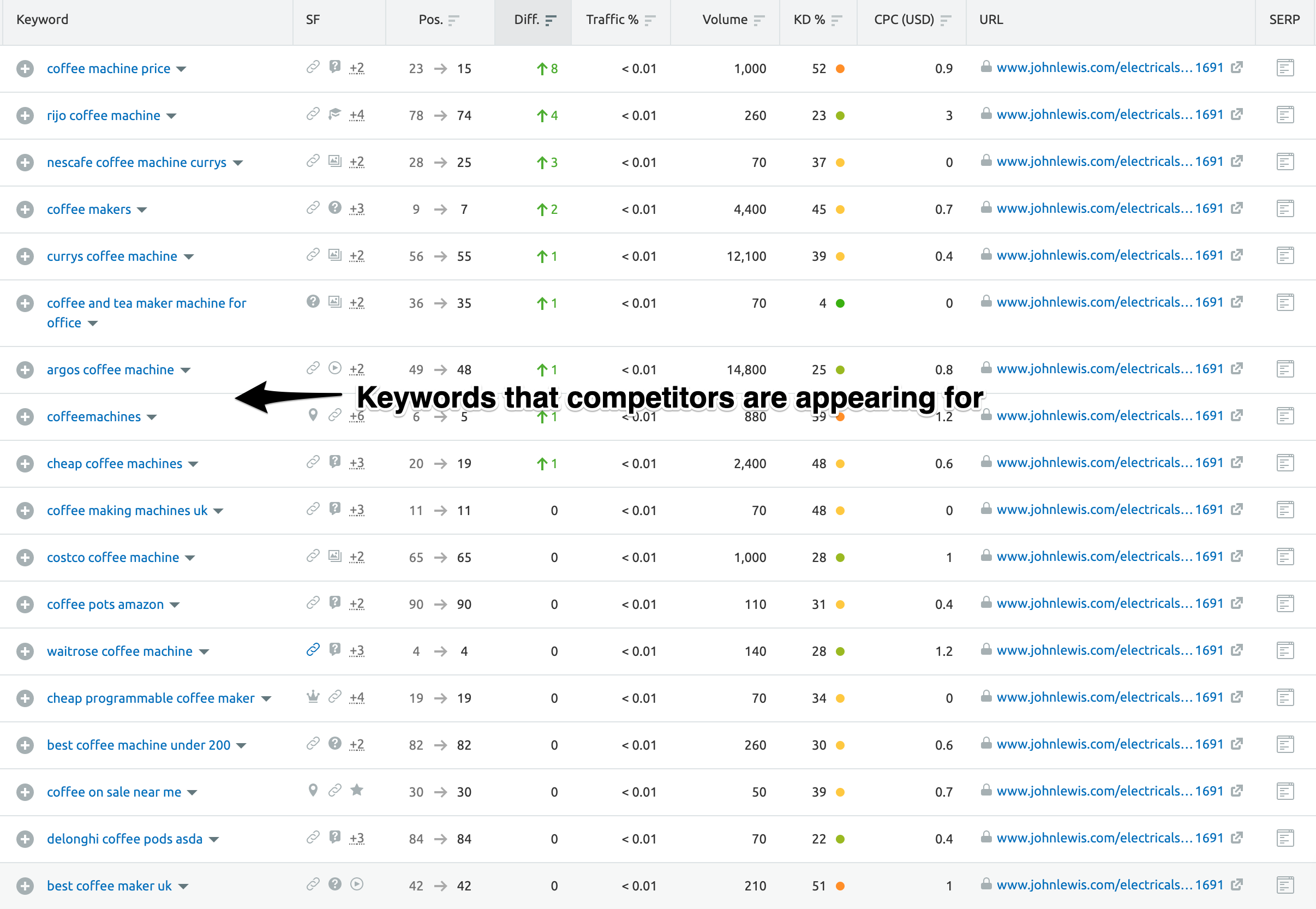
Take a look at the results for some of the target keywords you’ve already identified and begin to analyse the SERPs. For example, if you sell coffee machines you might find more of your competitors are showing up in results for “best espresso coffee machine” than they are for “espresso”. Quick searches like this will help to highlight which keywords will be most beneficial for you to target.
Keyword research is also about being realistic. Look for search terms where the top results are businesses and websites on a similar scale to your own. If websites such as Amazon or Wikipedia are constantly taking the top spot it will be one hell of a mission to try and knock them off.
Make use of Google’s features - Google itself has various features which can prove helpful when undertaking your keyword research.
- Autocomplete - The autocomplete feature is where Google will suggest search queries based on what you have already typed into the search bar. For example if you’ve identified “office chair” as a relevant keyword for your website, when you type it into Google the autocomplete feature will show you various relevant searches that users make featuring office chair as a keyword. This is a great way to find long-tail keywords to target and relevant phrases that you may have not otherwise thought of.
- Related searches - Google’s related searches features works in a similar way to the autocomplete feature in that it provides you with ideas for other relevant search queries. Once you’ve made an initial search query you’ll find a list of related search queries at the bottom of the results page. This is a great place to find actual phrases and keywords that people are actively searching for that are relevant to your content for you to target.
Keyword tools - Google and your competitors are both great places that can work wonders in informing your keyword research but you can also make use of various keyword research tools to help you out too.
Most keyword research tools work by inputting one primary seed word (e.g. espresso) and they will provide you with an extensive list of relevant keywords. Not only will they give you a list of relevant keywords they’ll also provide you with all the metrics you need to judge each keyword against. You can then hand pick the best ones to target which you think you stand the best chance of ranking for.
Tools such as SEMRush or AHREFS will also provide you with keyword lists based on exact matches and phrase matches, further widening the scope of the keywords available for you to begin targeting.
How to Analyse Keywords
When you’re analysing potential keywords there are three key factors to think about:
- Volume
- Difficulty
- Relevance
In an ideal world you want to try and target keywords that have the perfect balance between being relevant with a good search volume but low keyword difficulty.
Volume - You need to make sure that people are actually searching for your target keywords. Having the top spot in results would be amazing...but only if people are actually searching for that term, otherwise it’s pretty worthless.
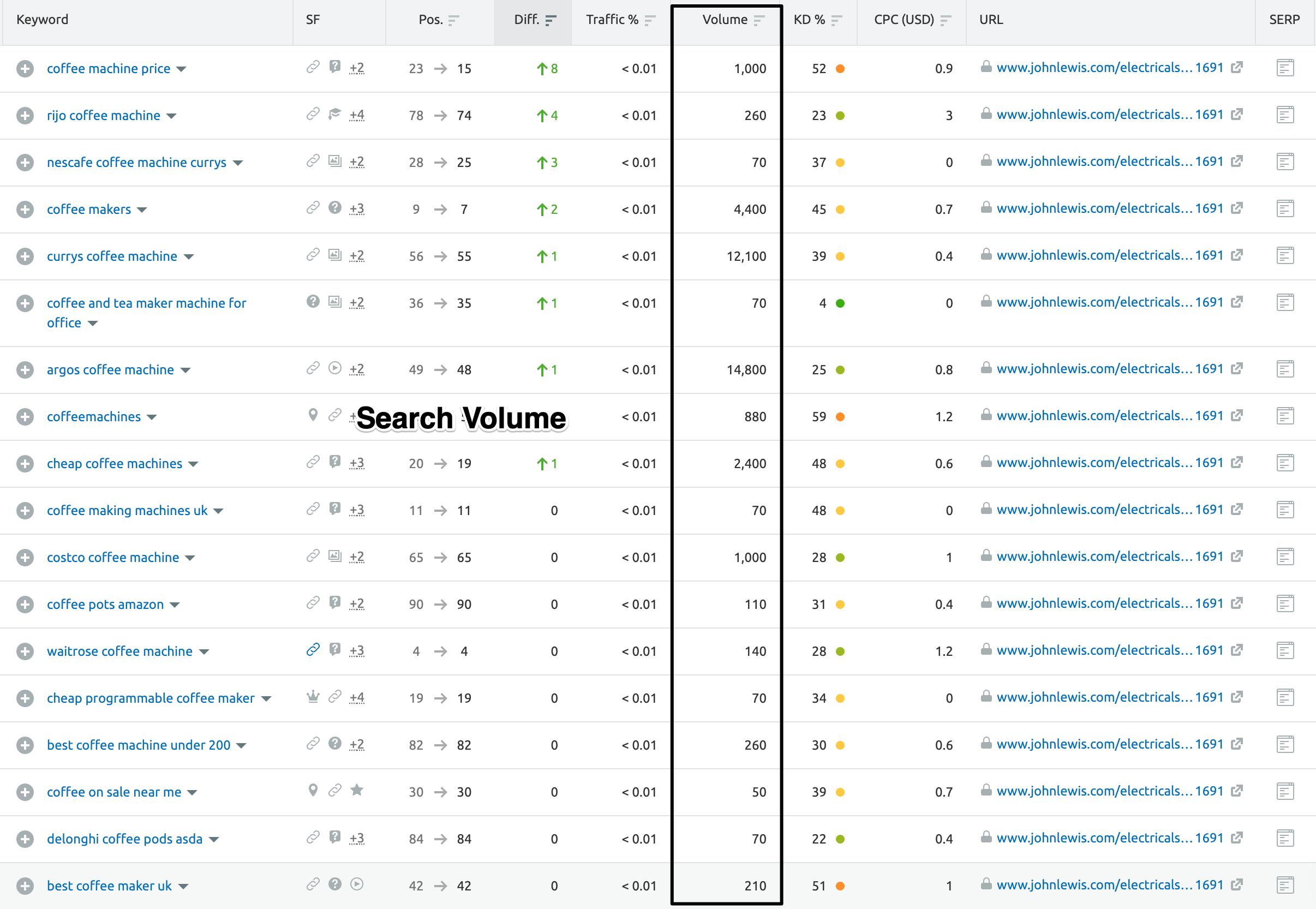
Search volume is calculated by working out the number of times a specific term is searched for per month. When choosing your keywords you need to select ones that have a high enough search volume to offer you value whilst still being realistic.
Don’t put all of your effort into trying to rank for a search term where the search volume is ridiculously high. You’ll be fighting a losing battle against far too many well-established competitors. For example if you’re an e-commerce platform selling tents, the chances of you ranking anywhere near the top spot for “tents” are very slim until you've established yourself in the SERPs. What you would have a better chance of ranking for however would be longer-tail keywords such as “waterproof tents”, “family waterproof tents” or “best waterproof tents uk”.
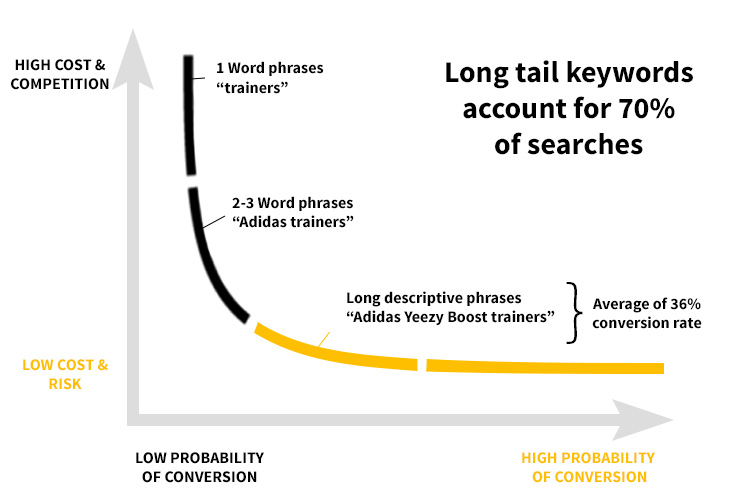
Before you select a keyword to target, you need to decide whether or not you realistically stand a good chance of ranking for it. If you think it’s going to be too hard then it’s often better to put your time and effort into alternatives.
Difficulty - Keyword difficulty is how hard or easy it will be for you to actually rank for a search term. In order to uncover the difficulty of a keyword you can make use of various keyword difficulty tools which will give your chosen keyword a score. The higher the difficulty score the harder it will be for you to rank for that term.
When thinking about the difficulty level of a keyword, you need to think about 3 key things:
- The authority of your website. Google will rank websites that it deems to be authoritative. The best way to improve the authority of your website is to create a strong backlink profile. If other authoritative and quality websites are linking to your content Google will take this as a signal that your content is authoritative too.
- The quality of your content. In order to rank well for your chosen keyword your content needs to be the very best. If you don’t think you can create content of the highest possible quality to target the keyword then it will be too difficult for you to rank well.
- The quality of your competitors' content. Take a look at the websites that are currently ranking well for your chosen keywords. Analyse their on-site optimisation, the quality of their content and their backlink profile. If you think you can do a better job then you stand a good chance of out ranking them in the search results.
Relevance - To be honest, Google is obsessed with relevance. It will only rank content that’s relevant so when undertaking your keyword research you need to decide whether or not the content on your website is relevant to your potential keywords.
You need to make sure that any content you create to target your keywords will be relevant to what the user is actually searching for. In order to rank in the top spot you need to make sure that you’re providing the most relevant option. If Google thinks someone else's content is more relevant than yours then it will rank them above you in the SERPs.

A great way to determine whether or not you’ll be able to create relevant content for the keyword is by taking a look at the existing SERPs. Find out what type of content and web pages Google is currently ranking for that search term. For example, if you sell gym equipment and want your product page to rank for “best gym equipment for women” but you discover that Google is ranking informational pages such as guides and reviews for this term, you can conclude that it will be unlikely for Google to deem your product page relevant enough to rank it.
Key Takeaways
Keyword research is an essential part of any SEO strategy but that doesn’t mean it needs to be complicated. Some of the key things to remember when undertaking keyword research are:
- Relevance is key. If you can’t create content that’s relevant to a keyword then don’t bother trying to target it.
- Make use of Google and the SERPs to understand exactly what users are searching for.
- Uncover which keywords are directing traffic to your competitors websites and target them too.
- Be realistic. If a keyword is going to be too difficult to rank for then don’t waste your time and effort trying. Similarly if the search volume of a keyword is too low ranking in the top spot will offer you next to no added value.
Whilst keywords are no longer the only ranking factor, Google still places a lot of importance on them. Keyword research will help you to rest assured that you’re targeting the very best keywords that offer the greatest chance of results.


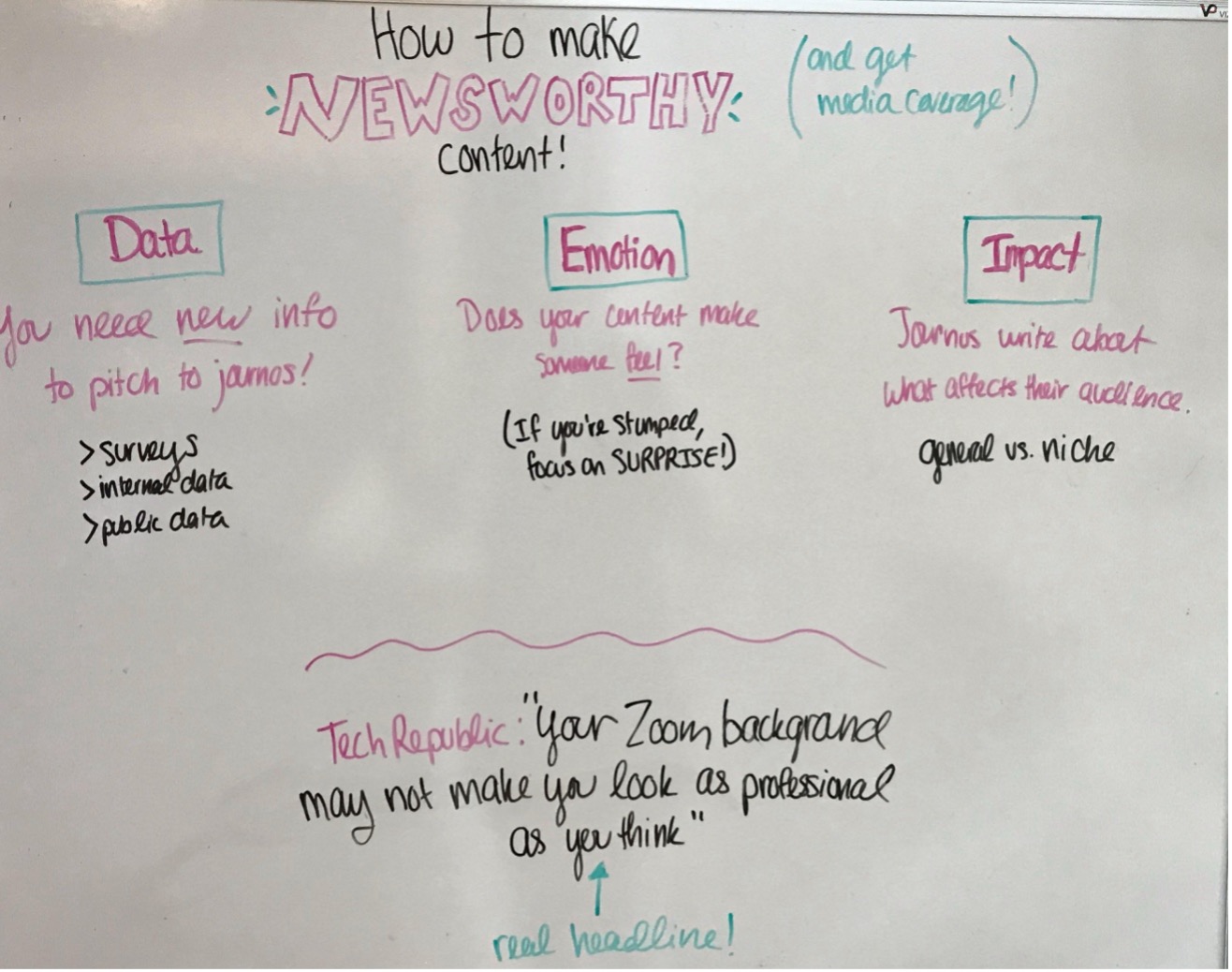
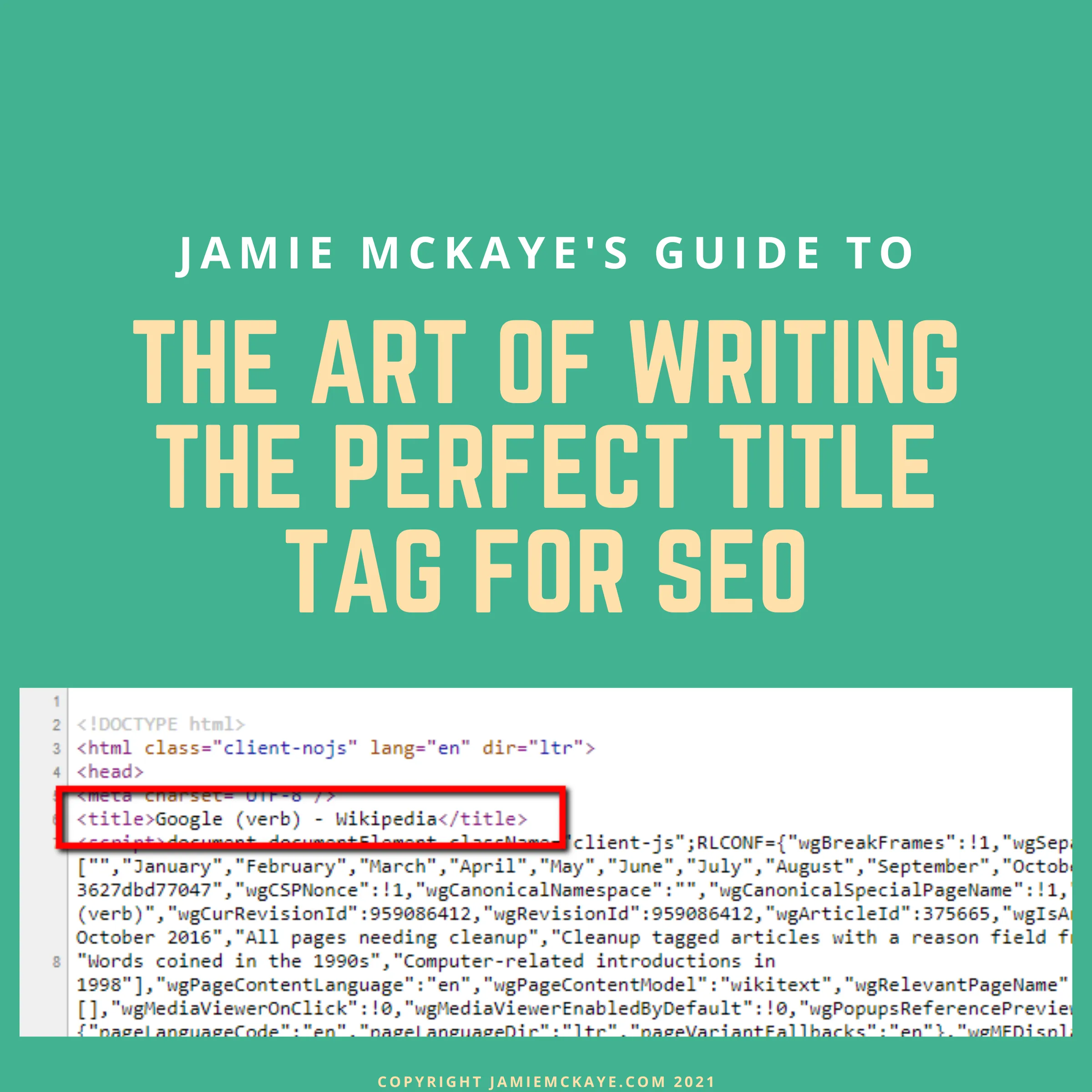

Comments